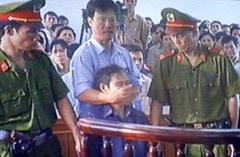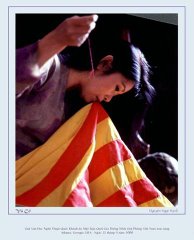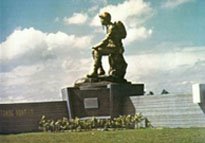A Show (and Tell) Trial in Vietnam
Time
By Kay Johnson/Hanoi
When Vietnam granted rare access to the trial of prominent dissidents, it may not have expected to produce the sight of communist officials slapping their hands over the mouth of a 60-year-old man — a Catholic priest, no less — and wrestling him out of the courtroom. But that is exactly what happened foreign journalists and diplomats saw in the trial of dissident priest Father Nguyen Van Ly and four other activists.
In Vietnam's highest-profile political case in years, the five defendants were found guilty of "conducting propaganda against the Socialist Republic" after a raucous, half-day trial Friday in which the priest loudly denounced the court as "the law of the jungle." At that point he was hushed up and hustled out to follow the proceedings by loudspeaker in an adjoining room where he eventually heard his sentence: Eight years in prison for helping set up and publicize a small, illegal opposition party, known as the Progression Party.
Such harsh punishment of dissent is not surprising in Vietnam, where the Communist Party remains firmly in control despite 20 years of economic liberalization. What was new is that the court spectacle in the ancient imperial capital of Hue was so open. Politically sensitive trials especially tend to be held quietly and — perhaps — announced after the fact.
For the past several years, Western diplomats have been urging Vietnam's government to promote "transparency and rule of law" as essential ingredients for fighting corruption and fostering smooth business transactions. The same terms are often polite code for allowing democratic movements to exist as well. Brad Adams, Asia director for Human Rights Watch, says he's not sure what message Vietnam's leaders were sending with the open trial in Hue. "It's possible they were just trying to tell everyone that they are so strong and so confident that, yeah you can come into our trials, and they're phony and it's a kangaroo court — and tough luck," Adams says. "It's also entirely possible that somebody in the system considers this is a small reform in opening up trials, even if what happened in the courtroom isn't very pretty." If Vietnam says it's just following the law in its dissident crackdown, the open trial could be seen as delivering on pledges of transparency, too.
Vietnam's government routinely denies that it has any political prisoners, but only punishes "criminals." Technically, at least, that's true. Under the country's criminal law, Article 88 — under which Father Ly and his colleagues were charged — forbids "conducting propaganda" against the state, with penalties from three to 12 years in prison. Articles 87 and 89, respectively, lay out punishments of up to 15 years for "undermining national unity" and "disrupting security." Recently, Vietnam has been cracking down against a small-but-determined group of dissidents — collectively calling themselves Bloc 8406 — that have recently been using the Internet to disseminate petitions for multi-party elections.
The government's evidence against Father Ly was clear enough. Prosecutors said when police raided Father Ly's diocese office and several homes in Hue over the lunar new year in February, they seized eight computers, nine cellphones and 147 SIM cards as well as 200 kilograms of documents denouncing one-party rule. "Their crime is damaging national security and serving as a tool of overseas reactionary and hostile forces against the government of Vietnam," the prosecutor told the court. The defendants had no lawyers present, but at least one didn't deny the charges. "For the country and the people of Vietnam, I will continue to fight for democracy," said the Progression Party co-founder Nguyen Phong, 32. Soon after that, the audio feed from the courtroom was abruptly cut-off. Phong was later handed a six-year sentence. (Two other defendants were given probation and Father Ly's assistant, Nguyen Binh Thanh, was sentenced to five years.)
Human rights groups quickly decried the trial as an attempt to silence others in Vietnam, saying the sedition laws violate Vietnam's constitution guaranteeing free speech. U.S. Deputy Consul Kenneth Chern attended the trial in Hue and said: "We call upon the Vietnamese government to allow individuals to peacefully exercise their rights of the freedom of speech without fear or recrimination." Whether Hanoi is prepared to listen could be seen later this year: police recently arrested a pair of human-rights lawyers and Bloc 8406 supporters, Nguyen Van Dai and Le Thi Cong Nhan, who had organized training sessions for political activists in the capital. They, too, are charged under Article 88. It's unknown whether their eventual trials will be so open.
Freedom of Speech Under Communism

Favorite Videos
We Will NEVER Forget.....

Favorite Links
Gone...but not forgotten.



Why this Blog?
There are 2 main reasons for this site:
1) There are many young Vietnamese who care about issues concerning Vietnam and the Vietnamese Diaspora, but cannot, or are not very proficient, at reading Vietnamese. Therefore, this site compiles and disseminates these news in English, so that the new generation of Vietnamese around the world can become more aware and, thus, closer to issues in the homeland.
2) Young Vietnamese have many ideas, many differing views on the prospects to democratize and develop Vietnam. The argument for peaceful development verses demands for justice and human rights. Which comes first? Can a civil, peaceful society be built without foundations of social justice?
These are the issues YOU can debate on this site. But remember, say what you mean, and mean what you say, but don't be mean when you say it.
1) There are many young Vietnamese who care about issues concerning Vietnam and the Vietnamese Diaspora, but cannot, or are not very proficient, at reading Vietnamese. Therefore, this site compiles and disseminates these news in English, so that the new generation of Vietnamese around the world can become more aware and, thus, closer to issues in the homeland.
2) Young Vietnamese have many ideas, many differing views on the prospects to democratize and develop Vietnam. The argument for peaceful development verses demands for justice and human rights. Which comes first? Can a civil, peaceful society be built without foundations of social justice?
These are the issues YOU can debate on this site. But remember, say what you mean, and mean what you say, but don't be mean when you say it.
Blog Archive
-
▼
2007
(106)
-
▼
March
(28)
- A Show (and Tell) Trial in Vietnam
- Dissident Catholic Priest Sentenced to 8 years in ...
- Dissident Catholic priest challenges Vietnam court
- The Not-So-New Vietnam - Wall Street Journal
- Vietnam repeals detention practice
- Vietnam crackdown targets dissidents
- Some liberties thrive, but communist regime allows...
- Democracy Alert: Growing Repression in Vietnam
- Vietnam Security Forces Threaten Family Members Of...
- Vietnam: Getting Away With Murder (Human Rights Re...
- Vietnam Watch News Roundup -- March 25, 2007
- Vietnam Watch News Roundup -- March 23, 2007
- Vietnam rejects Human Rights Watch's ‘wrongful rem...
- Vietnam Watch News Roundup -- March 21, 2007
- Journey from the Fall opens this Friday
- Interview with the wife of attorney Le Quoc Quan a...
- Human Rights Watch condemns Vietnam "crackdown" on...
- Vietnam to Consider Freeing Journalist After Inqui...
- Top Vietnamese Buddhist Slams Detentions Amid Ongo...
- Authorities refuse to renew BBC correspondent’s visa
- Republican lawmakers blast Vietnam rights violatio...
- Rep. Lofgren Calls on Secretary of State Rice to A...
- Vietnam: Crackdown on Dissent in Wake of WTO and APEC
- Kinks in Vietnam's armour
- 3,000 workers at Taiwanese factory in Vietnam go o...
- Vietnam police arrest two dissident lawyers in Hanoi
- Vietnam's communist authorities' desperate repress...
- Vietnam: A Paradise Haunted by Human Rights Abuse
-
▼
March
(28)

No comments:
Post a Comment